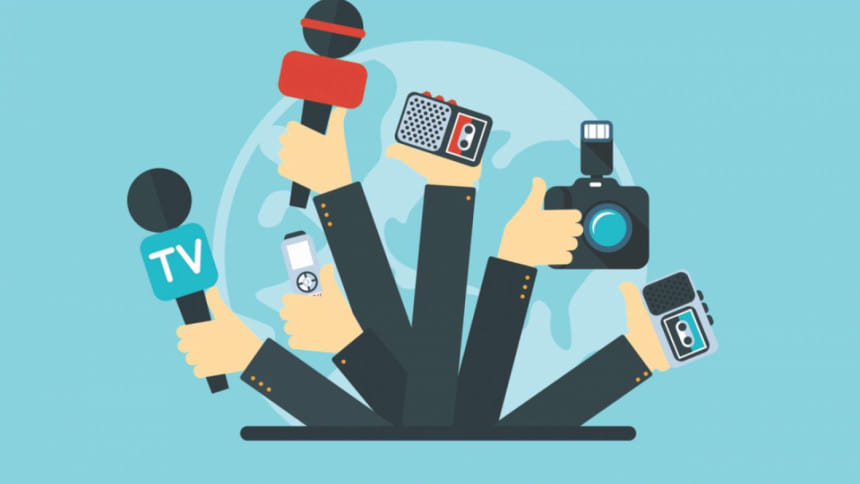Preserving integrity of the electoral process

The media in Bangladesh has traditionally played a pivotal role in all of our great national movements. Whether it be the role of the Swadhin Bangla Betar Kendra during the liberation struggle in 1971, or the vociferous campaign undertaken by our national dailies during the anti-Ershad struggle of the 1980s, our media has pushed itself to take strong ideological stances against the values or policies detrimental to the country. As such, the media is yet again poised, and some may say challenged by the public, to portray the kind of progressive and independent voice that can contribute towards creating the elusive level playing field in the upcoming 2018 Parliamentary Elections.
The symbolic, political and constitutional significance of the upcoming elections cannot and should not be undermined. Given the rise of technology and social media, it is very easy to promote unverified and ill-motivated news regarding political actors, parties and organisations. If social media can raise individuals from the ground up to the status of heroes, it can surely do the opposite too. As such, it is imperative for our media outlets, in print, television and online channels, to be leading advocates of the truth. The media as a collective is expected to educate voters on how to exercise their democratic rights, report on the development of electoral campaigns, provide platforms for political parties to communicate messages to the mass public, and scrutinise the electoral process in areas of fairness and efficiency.
Whilst the media is not the sole source of information in a globalised world, it is undoubtedly the most trusted platform as a source of news for the citizens. What a reputed newspaper says or the kind of talk shows a well-respected TV channel hosts, is indicative of the mood of the country and, by definition, sways political opinion. Think about any random dinner table conversation and how someone brings up a recent talk show amongst political leaders, which subsequently sets the tone for the discussion. The media is what the public look up to as a source of empirical data and opinions, and as such, its performance in the next year will surely be taken into account.
Now, when it comes to objectivity, the media is expected to be as neutral as possible. In the 1990s, former Prime Minister Begum Khaleda Zia made a famous comment that no one in Bangladesh is neutral, barring "crazy" people or children. To a large extent, this may be true. But neutrality of personal opinion is not the same as neutrality of professionalism. One expects the various media outlets in the country to have their own ideological stance, which, to a degree, is healthy for a country. But one also expects the media to play a professional and responsible role when it comes to objectivity of news when reporting the activities of our political parties and external institutions.
The majority of the American news media was biased towards Hillary Clinton in the 2016 US Elections, and, as such, played into the hands of President Donald Trump. The eccentric American president is waging an ongoing war against "fake news", which many Americans sympathise with. Stories about how leading news outlets such as CNN, New York Times and NBC, amongst others, failed to objectively point out Hillary Clinton's flaws and faults, both during her primary against Senator Bernie Sanders and later against Donald Trump, have seemingly resulted in much distrust towards the American media amongst Republicans, Democrats and independents alike.
We cannot, and must not, let such a thing happen in Bangladesh. We must remember that we are the same country in which many people believed they saw a politician's face on the moon. Ignorance is unfortunately still a major drawback in the democratic process in our society. The support for the kind of misogyny, sexism, racism and Islamophobia promoted by the current US president is baffling, but the role of the media is to point out these things from an observer's perspective, rather than exclusively supporting a candidate in elections. Bangladesh must be wary in this regard.
Whether a certain media outlet leans in favour of a political organisation must not be the sole precursor for presenting news. And to a large extent, our media outlets have tried to be the only platform for civilised and constructive dialogue within a socio-political framework. The talk shows hosted by our TV channels are followed by citizens with keen interest. Moderators, on most occasions, refrain from giving their personal opinions or judgements, and leave that to individuals divided by ideologies, professions and ideas, but united by the common quest to inform the public, albeit with their own political interests at play. This is healthy, and must continue.
It is true that the current Awami League regime has indeed provided increased licences for up-and-coming media outlets. Therefore, when one sees the kind of physical attacks on journalists while covering Begum Zia's recent trip to Chittagong, the nation feels disappointed. The violent nature of our politics, which one hopes will come to an end, is a reality for which there seems to be no short-term solutions. The fairness of the upcoming elections will have to be ensured by the journalists of the country, as was the case during the 2014 general election. But even before the election itself, the media must continue to be confident, decisive and informative. The nation wants to see candidate profiles; the nation demands to know what policies our parties stand for; the nation expects constructive dialogue on national television; and the nation hopes that the truth is set free through the media as a whole.
In Bangladesh there has been a recent trend of misconstruing news and making online users believe in anything and everything. Pictures are tampered with. Contents of video and audio recordings fought over politically. Established truths challenged. All of this is detrimental for any society aiming to be a democracy. Given these realities, the collective media has the most crucial role as a stakeholder in the electoral process, to showcase all that is true and verified, and not spread rumours and alienate the public further.
As former US President Barack Obama said, everyone is entitled to their opinion, but not their own facts. The media must promote, protect and preserve the integrity of the electoral process and of the truth, by doing what they have always done—being bold, enlightening and a shining beacon for hope and democracy in the country.
Mir Aftabuddin Ahmed is a student of economics and international relations at the University of Toronto. Email: [email protected]





Comments